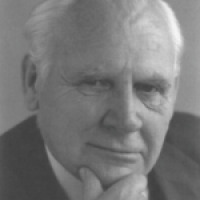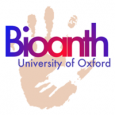Late Prof. Geoffrey A. Harrison
Late Professor Geoffrey Ainsworth Harrison
June 8, 1927 – September 14, 2017
"Geoffrey was born in Teddington, Middlesex, England and read Natural Sciences at Cambridge (Trinity) where he obtained a 1st class degree. He then moved to Oxford where he worked under the supervision of Joe Weiner in the Department of Anatomy. His DPhil was on adaptation of inbred and hybrid mice to hot environments.
His first academic position was as a Lecturer at Liverpool University and he went on to become a lifelong supporter of Liverpool Football Club. At Liverpool, he studied skin pigmentation. Liverpool was a major UK port and had particularly large volume trade with West Africa. This led to many of the West African seamen settling in the city and marrying white women. Their children were genuine F1 hybrids. Sufficient time had elapsed for some of these to have married producing children who were F2 hybrids. Using a reflectance spectrophotometer Geoffrey was able to accurately measure skin pigmentation of F1 and F2 hybrids and concluded that much of the variation in skin colour could be explained by 2 or 3 major genes.
In 1963 Geoffrey returned to Oxford as Reader in Physical Anthropology and remained at Oxford for the rest of his academic career, rising to Professor in 1976. While at Oxford he promoted the Human Sciences degree, and established the Diploma in Human Biology, the Department of Biological Anthropology (later the Institute of Biological Anthropology) and the MSc in Human Biology.
Geoffrey’s research explored a variety of problems central to biological anthropology including variation, adaptation, fitness and evolution – always focussed on living populations, with strong analytical and statistical research designs. His fieldwork was carried out in the UK and worldwide for example in Namibia, Ethiopia, Brazil, Papua New Guinea and in Australia. He commented that fieldwork was often far from easy, needed careful planning and required a capacity to handle considerable physical, if not social, privation. He said that he learnt most of the things one should not do from his first oversees expedition to Namibia when everything that could go wrong did go wrong! The initial plan was to document the genetic characteristics of the various populations of the Kalahari. However, on arrival, they learnt that there had been an outbreak of bubonic plague – and there were claims that there was an antigen overlap between the plague bacillus and ABH blood group substances. To quote Geoffrey ‘we thought we had been offered a heaven-sent opportunity to test for natural selection’. So, they started collecting hundreds of blood samples from infected areas – most of the samples spoiled because they were not properly equipped to refrigerate such large numbers. However, even if refrigeration had been available a simple calculation would have shown that thousands of samples would have been required to show a departure from Hardy-Weinberg equilibrium. Geoffrey concluded ‘don’t change the objectives of the expedition in the field – chronic discomfort and adversity are not good companions for clear thinking!’
Some of Geoffrey’s most significant contributions were from research in his own neighbourhood – the Otmoor region of Oxfordshire. Here he worked with 400-year old parish records to establish extensive genealogies, patterns of exogamy and other evolutionary processes. Later work included collection of blood samples for genetic analysis of living residents and the study of lifestyle influences on health status, sleep patterns and stress indicators. This was a pioneering study that others followed, and Geoffrey’s research on stress indicators carved out a whole new area of continuing exploration in biological anthropology.
After retiring in 1994 Geoffrey continued to teach for another 13 years or so. On his 80th birthday he taught his last seminar to a group of Oxford University students, took his motor cycle and cruised around Oxford streets for a couple of hours and very early that morning he took his XK140 Jaguar out to some countryside back roads and drove it at more than 100 miles/hour (about 160 kilometres/hour)! After this adventure, he took the Jaguar to the dealership and instructed the manager to sell it!
Besides his Oxford chair Geoff was also a visiting Professor at Harvard University and at the Australian National University. He was a member of many learned societies and took senior roles including President of the RAI, Chair of the SSHB, Chair of the Biosocial Society and was the Founding Chair of the Parkes Foundation. He was also an Editor of the Annals of Human Biology for many years and authored or edited numerous books including Human Biology, Man in urban environments and the Human Biology of the English village.
Geoffrey received many honours and awards. He held honorary degrees from Adelaide and Durham Universities, the Huxley Memorial Medal and Lecture from the RAI and the Franz Boas Distinguished Achievement Award from the Human Biology Association, USA. Geoffrey’s long and prosperous career set the directions of Biological Anthropology research in the UK and elsewhere for many years."
Professors Mike Little and Nick Mascie-Taylor
http://www.parkesfoundation.org.uk/images/Harrison%20obituary%20November...

Areas: Human Ecology, Genetics of Adaptation
Topics: Relationships between Adaptability, Environment and Fitness; Lifestyle & Wellbeing
Past Projects:
Adaptation to altitude
Geographical variance in blood polymorphism
Variation in human well-being and stress hormones levels
Determinants of human growth



